(12630 products available)










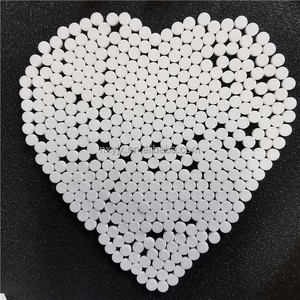






















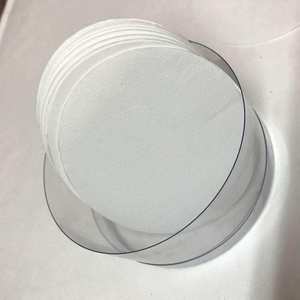
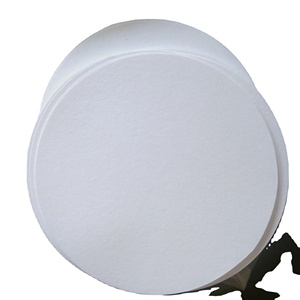
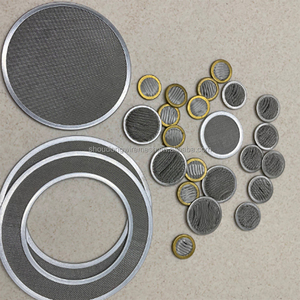


















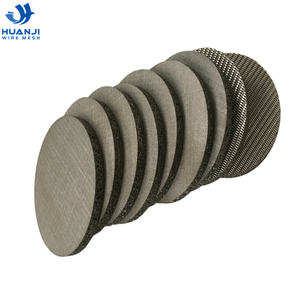































































































































































Die Filters disks are the core components of a die filtration system. They serve as strainers to filter and remove contaminants and undesired particles from the molten material before it enters the die for shaping. Typically, material like stainless steel, brass, or titanium alloy is used to manufacture filters disks. Filters disks can be categorized into these three types based on their structure and working manner.
Circle filter disc
Circle filter discs are circular-shaped filters. They are widely used and compatible with various dies and equipment. The circular shape allows the filter to effectively cover exit channels in the die, providing comprehensive filtration.
Funnel-shaped filter
Funnel-shaped filters, called converging filters, have a wide circular opening that gradually tapers down to a smaller circular base. They are designed to be installed where the channels rapidly converge, thus ensuring thorough filtration even in areas with high flow velocity.
Manifold filters
Manifold filters are used in manifold systems where multiple flow channels are gathered together to supply the molten material. They are designed to accommodate the specific configuration of the manifold system, ensuring uniform filtration for multiple flow channels simultaneously.
As a whole people know that proper maintenance of laboratory filter disks or industrial filter disks has a considerable impact on prolonging the service life and ensuring the stability of the filtration system. The following are some general maintenance methods for filter disks.
The application of filter disks is wide since they are essential products in the filtration industry. In laboratories, filter disks are used in various research and experiments. For instance, in chemistry, they are used to separate solids from liquids through the process of straining. In the medical field, disk filters are used to serve a wide range of purposes. For instance, they can be used in medical gas systems to ensure that gasses used in medical applications, such as oxygen, are free of contaminants. Additionally, they can be used in IV lines to ensure that the lines used in administering medicine are safe and free of harmful particles. Filter disks are also widely used in the environmental monitoring sector. They are used in the analysis of air and water quality by collecting the samples. Additionally, they are used in waste management through the sewage treatment process to ensure the effluent is compliant with environmental standards. In the food and beverage industry, wine and beer bottlers use filter disks to ensure their products are free of unwanted particles. Additionally, filter disks are used in animal farms. For instance, in poultry farms, disk filters can be used to ensure the drinking water for poultry is clean and free of pathogens. Agriculture is another industry that heavily relies on filter disks. They are used in irrigation systems to ensure the nozzles and lines don’t get clogged by sediment. Filter disks are also used in agriculture to protect pumps and drip emitters. Computers and other technological devices use filter disks prevent dust and other small particles from getting inside the device. Never forget that disk filters also play a significant role in the automotive industry. They are used in fuel systems to ensure clean fuel gets to the engine.
When buying a food slicing filter disk, there are some things that people need to pay attention to. Focus on the material so as to ensure its quality and safety. Furthermore, the mesh size and shape is also important to consider. The compatibility with the food processor is also a must to care about. People should also pay attention to its maintenance requirement so as to determine its durability. The size of the disk is also an important factor to consider.
Focus on the disk's material, such as BPA-free plastic or stainless steel. This choice of material determines not only the quality of food slicing but also its effect on human health. It has been proven that stainless steel filter disks have a longer lifespan and are more durable than plastic ones. However, they may be heavier and more expensive. Plastic filter disks, on the other hand, are lightweight and affordable, but they are more prone to wear and tear.
The mesh size and shape of the filter disk also affect food filtering options. A fine mesh filter disk can capture tiny particles and provide a smooth final liquid. On the contrary, a coarse mesh filter disk can let through some pulp and yield a textured juice. Moreover, filter disks are designed in different shapes such as round and oval, which are applicable for various types of blenders.
Users should ensure that the filter disks they purchase are compatible with their food processors. Using an inappropriate filter disk can result in an imperfect filtering process.
The maintenance requirement for a filter disk will affect its lifespan. Some filter disks mandate hand washing, while others are dishwasher-safe. Also, some filter disks are stain-resistant, so they only need to be wiped occasionally, while others require thorough cleaning every time.
When purchasing filter disks, people need to choose the proper size that fits the particular food processor they have. Using the wrong size may affect the function and result.
Q: What is disk filter agricultural?
A: A disk filter is used for irrigated agriculture. It is made up of plastic, stainless steel, and other materials. It has a large filtering area and can be automatically or manually cleaned. It is suitable for fields with a large amount of suspended matter.
Q: What are filter disks made of?
A: The materials can be varied according to different working environments and needs. Common materials include stainless steel, polypropylene, polyester, nylon, etc. Stainless steel achieves high strength and heat resistance. Polypropylene and polyester offer flexibility and durability under diverse conditions. Nylon is often used for precise filtering needs.
Q: What are filter discs used for?
A: Filter discs are used for different purposes. In the workshop, filter discs are usually used to remove rust, dirt, and old paint from metal surfaces. Metal filter discs are also commonly used in pipelines to drain water or any other liquid and stop solid particles from passing through. In the recounting process, filter discs can also mean filter paper to separate solid substances from liquid mixtures, especially in chemistry and biology.
Q: Do filters affect flow rate?
A: Disguised filters can reduce the flow rate of the liquid passing through them, especially if they are not kept clean. While filtering, they will stop solid particles from passing through, which may block the holes in the filter and reduce the flow rate.